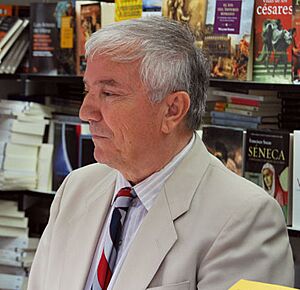Pancracio Celdrán facts for kids
Pancracio Celdrán Gomáriz (born in 1942, died on March 24, 2019) was a smart Spanish professor and writer. He was an expert in old history and literature, especially from ancient times and the Middle Ages.
Early Life and Learning
Pancracio Celdrán was born in Murcia, Spain. He studied a lot! He earned a degree in Spanish literature and a special doctorate degree in philosophy. He also got master's degrees in history and studied many other subjects. These included Middle Eastern history, English literature, and even the Hebrew language.
His Work and Career
Celdrán worked as a professor at many universities. He taught in the United States, at places like the University of California, Berkeley. He also taught in Europe and Israel, at universities like the University of Haifa and the Hebrew University of Jerusalem. He was also a guest professor in Beirut, Lebanon.
Besides teaching, Celdrán was also a journalist. He wrote for newspapers and appeared on television sometimes. But he mostly worked in radio. He wrote shows, produced them, and reported from different places. He also joined radio discussions with other experts.
He was a regular contributor to a weekend radio show called No es un día cualquiera (which means "It's Not Just Another Day"). This show was on Radio Nacional de España. He also helped with language questions for El Semanal, a Sunday magazine. While he was well-known, some of his ideas about language and other topics were sometimes seen differently by others.
Celdrán wrote many books. He also contributed to Raíces ("Roots"), a magazine about the Jewish community in Spain.
His Death
Pancracio Celdrán passed away on March 24, 2019. He died in Madrid, Spain, when he was 77 years old.
Why He Was Important
One of Celdrán's most important books was his Diccionario de topónimos españoles y sus gentilicios. This big dictionary, published in 2002, lists Spanish place names and the words for people from those places. The Spanish Wikipedia uses his dictionary as a main source. It helps them find correct names for places, both old and new.
See also
 In Spanish: Pancracio Celdrán para niños
In Spanish: Pancracio Celdrán para niños
 | Mary Eliza Mahoney |
 | Susie King Taylor |
 | Ida Gray |
 | Eliza Ann Grier |


